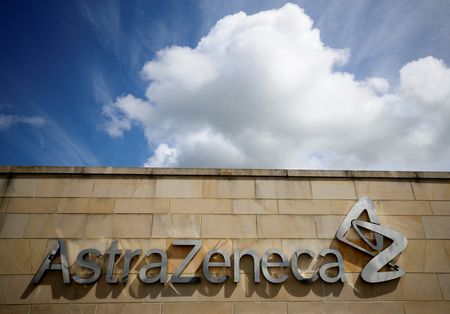By Pushkala Aripaka
(Reuters) -AstraZeneca plans to file for regulatory approval of its experimental blood pressure treatment before the end of the year, a senior company executive said, about a product seen as key to the drugmaker’s long-term sales strategy.
The company is aiming for potential approvals in 2026 for the drug, baxdrostat, starting with the U.S. and the EU, said Ruud Dobber, president of AstraZeneca’s biopharmaceuticals unit, ahead of a presentation of advanced trial data at a medical conference on Saturday.
Baxdrostat targets blood pressure-regulating hormone aldosterone, a novel approach compared with older treatments like diuretics and ACE inhibitors, which do not address hormonal drivers.
AstraZeneca expects peak annual sales for the drug to exceed $5 billion.
Keenly watched data showed that 2mg of baxdrostat, added to standard treatment, reduced systolic blood pressure by 9.8 millimetres of mercury (mmHg) from the baseline at 12 weeks, when adjusted for placebo, in patients with hard-to-control hypertension.
At the 1mg dose, that pressure exerted on the arteries by the heart’s pumping action was lowered by 8.7 mmHg.
Physicians polled by TD Cowen wished to see a 10-12 mmHg fall in placebo-adjusted blood pressure, the brokerage said on Friday.
Mineralys Therapeutics’ rival drug, lorundrostat, in March showed a placebo-adjusted reduction in systolic blood pressure by 9.1 mmHg at six weeks with a 50mg dose. The U.S. company also expects to submit data to the FDA by year-end.
“There’s a huge acknowledgement that hypertension needs to be treated in a much more aggressive way,” Dobber said.
High blood pressure affects over 1 billion people, according to the World Health Organization, and aggravates risk of heart attacks or strokes.
A small percentage of patients – 1.1% – taking baxdrostat developed hyperkalaemia, marked by high potassium levels in the blood. Hyperkalaemia was also observed with Mineralys’ lorundrostat.
(Reporting by Pushkala Aripaka in Bengaluru; Editing by Sahal Muhammed)











